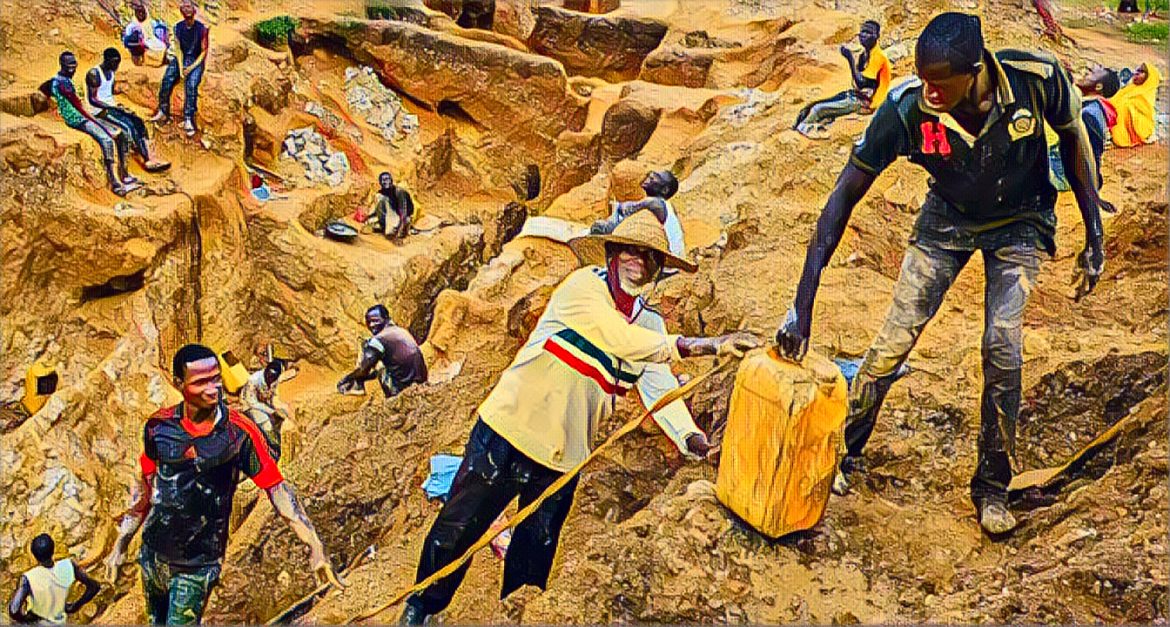In southwest Nigeria, there is a concerning collaboration between certain traditional monarchs and illegal foreign miners. This alliance is aggravating the looting of the region’s natural resources, worsening local insecurity, and necessitating prompt environmental remediation. This alarming trend highlights a broader pattern of corruption and mismanagement in Nigeria’s extractive industries that extends deep into the grassroots of these communities.
During a session before the House of Representatives in December 2023, Mr. Dele Alake, the Minister of Mines and Mineral Development, brought to light the involvement of some “powerful Nigerians” in illegal mining activities that were also promoting banditry to conceal their operations. Alake emphasized that these were not small-scale artisanal miners but influential figures exploiting the system to the detriment of the nation. He suggested that the insecurity commonly associated with this sector, ranging from banditry to terrorism, is primarily sponsored by these illegal miners.
The minister’s allegations have brought to the fore the involvement of some Yoruba monarchs who are reportedly colluding with foreign nationals to mine solid minerals illegally. Despite Section 44(3) of the Nigerian Minerals and Mining Law of 1999, which vests control of mineral resources in the federal government, these monarchs, with the support of some government and security officials, enable foreign entities to exploit these resources unlawfully.
Illegal mining activities in Nigeria pose a significant threat to the economy and socio-political stability of the region. The report by ENACT Africa highlights that foreign nationals, especially from China, have been caught in these illegal operations. Nigeria has a diverse range of mineral resources, including barite, bitumen, iron ore, lead, zinc, coal, limestone, and gold, with an estimated potential market value of around $700 billion. However, due to the lack of transparency in the extraction processes, insecurity, and organized crime, most of this potential remains untapped or is exploited illegally.
As per the Federal Government’s 2024 revelation, Nigeria loses approximately $9 billion per year to illegal mining activities. This not only reflects an economic loss but also represents missed opportunities for legitimate economic development and employment that these resources could have driven.
In recent years, the South-west region has witnessed a concerning increase in insecurity due to conflicts between local communities and the influx of illegal miners and bandits, attracted by the area’s lucrative mining potential. These conflicts often lead to violent clashes, particularly between farmers and miners, further destabilizing the region.
Monarchs in the region have been accused of exacerbating this situation by arbitrarily selling off land, which often contains valuable mineral deposits, to these illegal operators. Such actions have sparked numerous conflicts between communities and miners, especially in states like Oyo, Osun, Ekiti, and Ondo. In Lagos and Ogun, illegal sand mining is rampant, with similar disregard for legal and environmental norms.
The environmental impact of these activities is profound. Illegal mining operations typically involve heavy machinery and the use of explosives, which not only destroy the landscape but also contaminate water sources, reduce air quality, and disrupt the ecosystem. This devastation is often visible in the abandoned mining pits scattered across the landscape, which pose significant hazards to both human health and wildlife.
The local population suffers immensely from these operations. Farmers find their lands seized or ruined, leaving them without the means to sustain their livelihoods. Moreover, the influx of foreign workers often leads to social tensions and cultural clashes, adding to the region’s security challenges.
The gravity of this issue was underscored by the suspension of a traditional ruler in Oyo State by Governor ‘Seyi Makinde in early 2024, following allegations of the ruler’s involvement in illegal mining activities. This action highlights the state government’s recognition of the problem and its commitment to addressing it.
The environmental and social upheavals caused by illegal mining have prompted calls for more robust enforcement of Nigeria’s mining laws and greater accountability for those involved in these activities. Experts argue that without a decisive crackdown on these illegal operations and a concerted effort to regulate the mining sector properly, the damage to the region’s social fabric and natural environment will be irreparable.
To address these challenges, a multi-faceted approach is needed to strengthen legal frameworks, enhance surveillance and enforcement mechanisms, and foster community engagement to ensure that mining benefits all stakeholders. Additionally, there is an urgent need for environmental restoration projects to repair the damage done by these illegal activities.
Educational and awareness campaigns are also crucial to inform both the local population and the miners about the legal and environmental implications of their activities. By promoting sustainable mining practices and encouraging local participation in the mining sector, the region can harness its mineral wealth in a way that promotes economic development and social cohesion.
The situation in Nigeria’s southwest represents a critical juncture for the country’s management of its mineral resources. The involvement of traditional rulers in illegal mining underscores a broader governance crisis that requires immediate and sustained intervention. Without it, the region risks continued environmental degradation, social
Source: The Guardian


